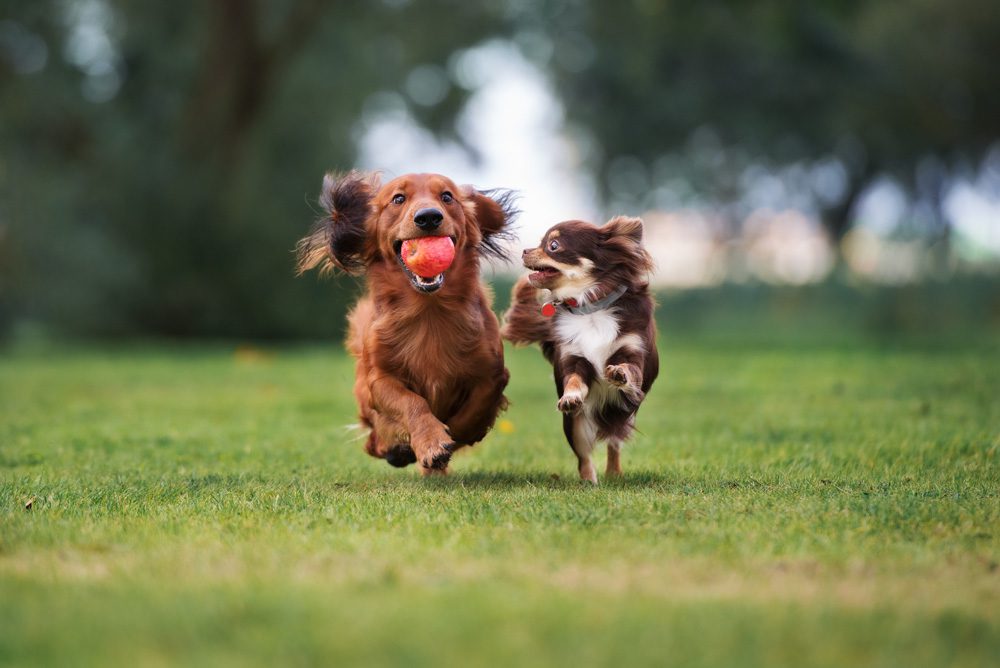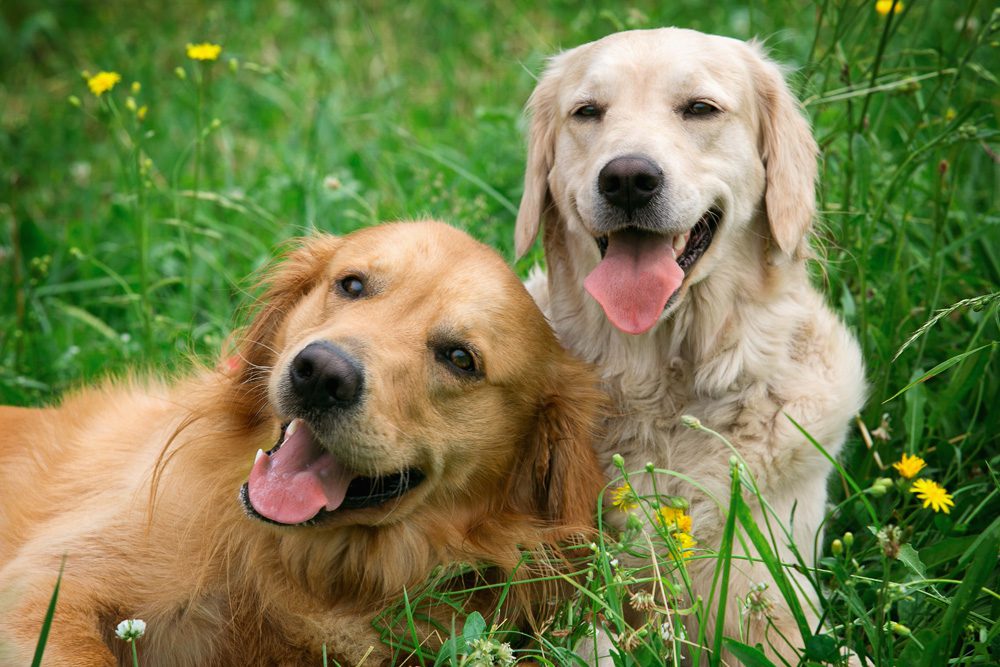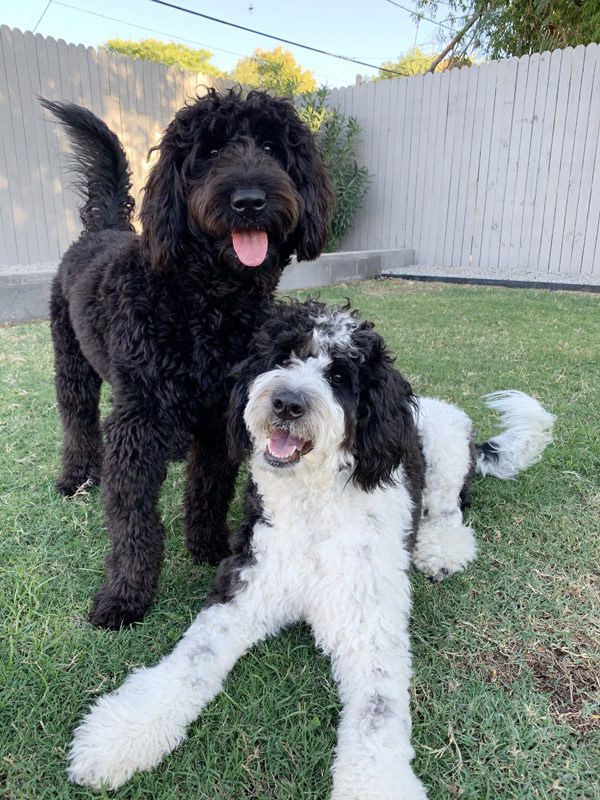Getting Your Dog A Dog
Dogs truly are man’s best friend, but have you ever found yourself wondering if your best friend needs a best friend? Adding a new member to the family is exciting, but with every new pet comes new responsibility. If you’re on the fence about em’bark’ing on this journey, here are a few reasons that having two dogs may be better than one!
1. Reducing Separation Anxiety
Dogs, much like their wolf ancestors, are inherently social creatures. They form strong attachments to their “pack members” living in their households. Unfortunately, many of us cannot be home with them all the time, and some dogs can become very upset when left alone. Oftentimes, these cases require extra attention and solutions, like specialized training, emotional therapy, or even medication.
While there several ways to ease separation anxiety, adding another dog to the household is one way that can help reduce their stress levels. They can keep each other company while they wait patiently for you to return!
2. Built in playmate
Another benefit of having more than one dog is that your pets will always have a playmate! Play and exercise are essential for your dogs’ physical and mental health. Having another pal of their own species can keep your dogs entertained and increase their overall health. It can even help to tire them out, meaning that they will require less exercise on a daily basis!
Time and time again, we see that adding a second dog to the pack results in a happier and healthier first dog! They are social creatures and will feed off each other’s energy. Dogs without playmates may find it more difficult to get inspired to play without you doing a large part of the work getting them excited and engaged. When there are multiple dogs in the household, these playtimes happen organically and require much less effort in getting them “fired up” for some exercise.
That said, your dogs will still require human attention on a daily basis, so make sure that you are still making room in your schedule for your four-legged friends. Another important factor to consider is the temperament of your original dog. A new puppy will have a lot of energy, but eventually they will grow to adulthood and settle into the energy levels more typical for their breeds. Many dog breeds can be friends, but perhaps don’t count on a Shih Tzu being able to wear out your Golden Retriever!
3. Training is easier
Have you ever watched a child imitate their older sibling? Dogs do the same! Your dog already knows the routines of your home; they know where to use the bathroom, when mealtime is, and when to expect a walk. Your new puppy can take cues from the older dog as they grow accustomed to their new home. Of course, it is easier to grasp the meaning of certain commands and situations when you have a mentor to show you how it is done!
Dogs tend to look to their pack leader for guidance and there’s a good chance that will be your existing pet. They will benefit from having these cues and established routines and places to go potty. Dogs tend to do their business where other dogs have already gone, so your puppy will likely smell it and use the exact same spots to relieve themselves.
With the help of your older dog, your new puppy will have a head start when it comes to basic obedience and potty training! Just be careful – your old dog will model all their habits for their new friend, which includes the bad ones! The good news is that it is never too late to start training with either pup! Check out our blog post on common pitfalls to avoid when training.
 4. Not necessarily double the cost
4. Not necessarily double the cost
Bringing home a new dog is going to come with additional expenses. Before committing to a second dog, please take the time to seriously consider if you will be able to invest in your new pet’s healthcare, training, grooming, and boarding.
The good news is that you are not starting completely from scratch! Some things, such as toys, beds, and grooming products, can be shared between pets. Food and treats can be purchased in greater bulk. You may even have some of your puppy supplies that your older dog has outgrown that are ready to be passed down to their new puppy sibling!
5. Twice as much love!
This last aspect of adding another puppy to your home is perhaps the most obvious but the most significant. Having another dog in your home means bringing in another source of joy and unconditional love. As all dog owners can attest, there is nothing quite like the devotion of a dog. Having an additional pet may be more work, but the rich reward of having twice the love is worth it!
 Considerations
Considerations
We at Puppies N Love and Animal Kingdom are strong proponents of responsible pet ownership. Before moving forward with getting another dog, there are many factors to consider. First is the most important question, can we provide for this dog? If that is a confident “yes” then let’s review the other factors!
Temperaments
You know your dog better than anyone, so carefully consider what type of dog will make your dog happiest! Some male dogs tend to have more “alpha” personalities and can dominate others, sometimes causing issues when they feel threatened by others. A bad match for a dog like this is another male dog, especially one that is also an alpha. Getting these dogs neutered can go a long way with these tendencies, but a safer bet for a dog like this is going with a female dog with a softer personality.
Mixing genders can help provide balance in the household, but two boy dogs and two girls dogs can work of course when their personalities go well together! As far as breeds go, it would be beneficial to pick dogs with similar size and energy levels. Sometimes adding a smaller more energetic breed to an existing big dog (i.e. a laid back Great Dane) in the house can cause undue stress on your large breed.
 If you aren’t sure what kind of dog your dog would like, try playdates with other dogs or visiting your local dog park. Read your dog’s body language and assess what brings happy and or stress signals. Respect your dog’s boundaries and if they show signs of reactivity with other animals, you may need to reconsider getting them a friend until that improves with training.
If you aren’t sure what kind of dog your dog would like, try playdates with other dogs or visiting your local dog park. Read your dog’s body language and assess what brings happy and or stress signals. Respect your dog’s boundaries and if they show signs of reactivity with other animals, you may need to reconsider getting them a friend until that improves with training.
Avoid getting two very strong alpha personalities. If you want to see how your dog will react to a specific dog, have them meet in a neutral setting and see how they interact. Mediate the interaction with leashes if you are concerned about their behavior.
Transition
Of course, you should have your dog socialized well regardless of any plans to add another pet to your family, but if you have a timid and unsocialized dog the transition is going to be more difficult. Socialize your dog well with other animals to ensure they trust other pets early on to make sure they could handle some more furry family members.
If needed, there are a few things you can do to soothe the stress of another dog being added to the family. First, the introduction should happen on neutral grounds so that your existing dog does not feel the need to establish that ownership with dominant or protective behaviors. Second, take a lot of time on the introduction and work with each dog separately. Spending time one on one, maybe even outside the house, with your existing dog will help them understand they are still a priority.
 Age
Age
Generally you should avoid adding a young puppy to your dogs life if they are geriatric. Sometimes we can see how younger dogs joining a pack can give new life to your older dog, but be mindful of the impact it has on them. Consider an older puppy or one with a more easy-going personality to protect your old dog from getting beat up or bothered too much! If you do it right, then their new friend will improve their life instead of stress them out during their golden years.
Timing
Adding another dog to your family is a big deal – and a ton of work! Make sure that you have enough time to dedicate to their success in their home. Establishing expectations and forming bonds takes training and a lot of time.
It is important that you also have individualized time with each dog, especially if you are getting two at once from the same litter. You want your dogs to bond with you as their leader and not just with each other. If they only bond with each other then you may become viewed as an outsider and experience what is anecdotally referred to as “littermate syndrome.” To avoid this altogether, it is wise to stagger the timing in which you acquire two pets if that is your goal. Give yourself time to raise the first one well with plenty of socialization and training, and that dog will kindly thank you with helping you raise their new little sibling.
Conclusion
Having two dogs is more work, but the pros outweigh the cons. From easier training to better mental and emotional health (for you and your dogs) to doubling down on the joy and love in your life… It’s a no brainer, the more the merrier! If you have the space in your schedule, your home, and your heart, then find your perfect puppy today!




